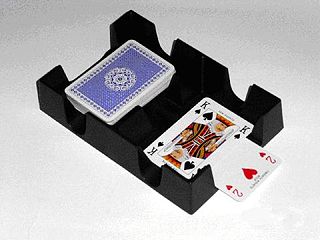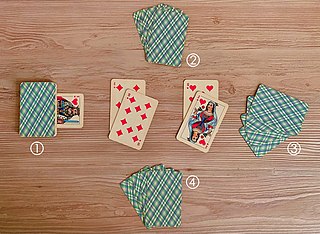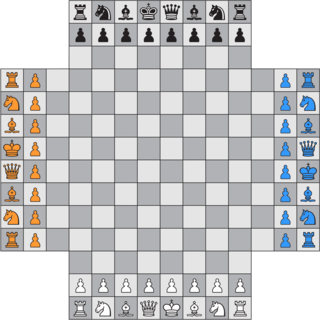
Field hockey is a team sport of the hockey family. Each team plays with ten field players and a goalkeeper, and must carry a round, hard, plastic hockey ball with a hockey stick to the rival goal.

A kick is a physical strike using the leg, in unison usually with an area of the knee or lower using the foot, heel, tibia (shin), ball of the foot, blade of the foot, toes or knee. This type of attack is used frequently by hooved animals as well as humans in the context of stand-up fighting. Kicks play a significant role in many forms of martial arts, such as capoeira, kalaripayattu, karate, kickboxing, kung fu, MMA, Muay thai, pankration, pradal serey, savate, sikaran, silat, taekwondo, vovinam, and Yaw-Yan. Kicks are a universal act of aggression among humans.

Volleyball is a team sport in which two teams of six players are separated by a net. Each team tries to score points by grounding a ball on the other team's court under organized rules. It has been a part of the official program of the Summer Olympic Games since Tokyo 1964. Beach Volleyball was introduced to the programme at the Atlanta 1996. The adapted version of volleyball at the Summer Paralympic Games is sitting volleyball.

Canasta is a card game of the rummy family of games believed to be a variant of 500 Rum. Although many variations exist for two, three, five or six players, it is most commonly played by four in two partnerships with two standard decks of cards. Players attempt to make melds of seven cards of the same rank and "go out" by playing all cards in their hand. It is "the most recent card game to have achieved worldwide status as a classic".

Dodgeball is a team sport in which players on two teams try to throw balls and hit opponents, while avoiding being hit themselves. The objective of each team is to eliminate all members of the opposing team by hitting them with thrown balls, catching a ball thrown by an opponent, or inducing an opponent to commit a violation, such as stepping outside the court.

Tag is a playground game involving two or more players chasing other players in an attempt to "tag" and mark them out of play, usually by touching with a hand. There are many variations; most forms have no teams, scores, or equipment. Usually, when a person is tagged, the tagger says, "Tag, you're 'it'!" The last one tagged during tag is "it" for the next round.

A strike is a directed physical attack with either a part of the human body or with an inanimate object intended to cause blunt trauma or penetrating trauma upon an opponent.

Durak is a traditional Russian card game that is popular in many post-Soviet states. It is Russia's most popular card game, having displaced Preferans. It has since become known in other parts of the world. The objective of the game is to shed all one's cards when there are no more cards left in the deck. At the end of the game, the last player with cards in their hand is the durak or 'fool'.

Tetherball is a game where two players use their hands to strike a volleyball which is suspended from stationary metal pole by a rope or tether. The two players stand on opposite sides of the pole, and each tries to hit the ball one way; one clockwise, and one counterclockwise. The game ends when one player manages to wind the ball all the way around the pole so that it is stopped by the rope. It must not bounce.

Briscola is one of Italy's most popular games, together with Scopa and Tressette. A little-changed descendant of Brusquembille, the ancestor of Briscan and Bezique, Briscola is a Mediterranean trick-taking, Ace-Ten card game for two to six players played with a standard Italian 40-card deck. The game can also be played with a modern Anglo-French deck, without the eight, nine and ten cards. With three or six players, twos are removed from the deck to ensure the number of cards in the deck is a multiple of the number of players; a single two for three players and all four twos for six players. The four- and six-player versions of the game are played as a partnership game of two teams, with players seated such that every player is adjacent to two opponents.

Four-player chess is a family of chess variants typically played with four people. A special board made of standard 8×8 squares with an additional 3 rows of 8 cells extending from each side is common. Four sets of differently colored pieces are needed to play these variants. Four-player chess generally follows the same basic rules followed on regular chess. Exceptions to these rules include nuances of when checkmate is delivered, depending on the variant, on what rank a pawn promotes, and the ability to capture a player's king, which takes priority over checkmate in the teams variant. There are many different rule variations; most variants, however, share the same board and similar piece setup.

The front kick in martial arts is a kick executed by lifting the knee straight forward, while keeping the foot and shin either hanging freely or pulled to the hip, and then straightening the leg in front of the practitioner and striking the target area. It is desirable to retract the leg immediately after delivering the kick, to avoid the opponent trying to grapple the leg and to return to stable fighting stance.
Hot Box is a non-contact team sport which is similar to ultimate, but played on a smaller field and with fewer players. Like ultimate, the object of the game is to score points by passing the disc into the end zone; however, in Hot Box there is generally only one end zone and it is of much smaller size than an Ultimate end zone. In this way, hot box is a "half-court" variant of ultimate. Because of these reduced requirements, it is often played when not enough players are available to play ultimate.
Butts Up or Wall Ball is a North American elementary school children's playground game originating in the 1950s or earlier.. It is slightly similar to the game Screen Ball, and began in the 1940s or 1950s as a penalty phase of various city street games. Butts Up is played with a ball on a paved surface against a wall, with a variable number of participants—usually more than three and often likely to exceed ten. Butts Up tends to be played during recess, before or after school.. Popular in New England is another frequent variation of wallball that usually differs a lot from the more widely known 'Butts Up'.

The flare is an acrobatic move in which the performer alternates balancing the torso between either arm while swinging the legs beneath in continuous circles. It is a fundamental b-boying/bgirl power move, and in gymnastics it may be performed on a pommel horse or during the floor exercise. The move is commonly spelled flair in gymnastics and further may be called a "Thomas flair" after its originator, Kurt Thomas.
Several sports related to volleyball have become popular. Indoor volleyball and beach volleyball are both events at the Olympics, and sitting volleyball is an event at the Paralympics. Other varieties are localised, or are played at an amateur or informal level.
Traditional Filipino games or indigenous games in the Philippines are games that have been played across multiple generations, usually using native materials or instruments. In the Philippines, due to limited resources for toys, children usually invent games without needing anything but players.

A footbag is a small, round bag usually filled with plastic pellets or sand, which is kicked into the air as part of a competitive game or as a display of dexterity. "Hacky Sack" is the name of a brand of footbag popular in the 1970s, which has since become a generic trademark.













